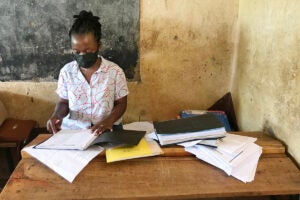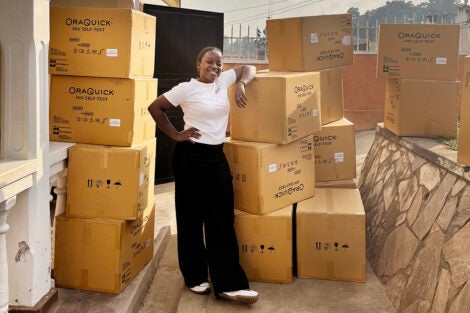Valencia Lambert, SM ’24, brings a passion for community partnerships to her work addressing women’s reproductive health and infectious-disease outcomes in sub-Saharan Africa.
February 1, 2024 — Growing up in Tanzania, Valencia Lambert was aware from a young age that inequities can impact health decision making and access to quality care. It’s what sparked her initial interest in the field of public health. “I’ve always had a game plan to use my ambitions for advocacy, to embrace different perspectives, and to fully dive into public health in my work,” said Lambert, a master of science candidate at Harvard T.H. Chan School of Public Health. “And to always dig deeper, to learn more.”
Lambert first moved to the United States to attend Cornell University for her undergraduate studies, where she studied global and public health sciences and human development. She said that she yearned to build new skills that she could use to help her community.
Soon after graduating in 2020, she returned to Tanzania, where she worked as a research assistant for a project focused on contraceptive use in the country’s rural northwest. Run by the Center for Global Health at Weill Cornell Medicine, the project allowed her to combine her academic interests with her passion for empowering and supporting women.
Evaluating women’s contraceptive autonomy
In some sub-Saharan African communities and elsewhere around the world, women may be dissuaded from using contraception after hearing about possible side effects, fear-inducing myths, and misconceptions, as well as others’ opinions and beliefs about the subject. The project Lambert joined was a randomized trial of a family planning seminar for religious leaders, looking at whether contraceptive use changed in communities where the intervention occurred. Key to the team’s success with this and other projects was the fact that the Tanzanian principal investigator was a practicing pastor.
“It’s common for religious leaders to present this idea that family planning is not acceptable,” Lambert said. “[The PI] was able to leverage his experience as both a pastor and a Tanzanian to ensure that the intervention was appropriate, acceptable, and feasible.”

Lambert’s analysis focused on another aspect of the project—evaluating the influences that impact women’s contraceptive autonomy. The team interviewed nearly 75 women to understand what influenced their use of family planning through three classifications: intrapersonal, which includes their own knowledge of family planning and interpretations of religious beliefs; interpersonal, which includes thoughts from intimate partners, friends, parents, and relatives; and community, which includes health professionals, religious leaders, and other women in their communities. They found that the women were highly influenced by their families and social networks.
“It was rare that a woman decided completely on her own about whether or not she would use family planning,” said Lambert, noting that understanding the influences on women’s health decisions is a critical first step in implementing family planning interventions. “In certain patriarchal communities, a woman’s decision is highly influenced by her husband’s perceptions of family planning,” she said. “Hence, if you don’t engage men, then the intervention might not be received well by the community.”
She hopes that the project’s focus on educating religious leaders about family planning and guiding them to pass that knowledge along to their communities can ultimately allow both men and women to make more informed decisions regarding whether family planning is the right choice for them.
With this sort of educational effort, Lambert believes in following the Golden Rule. “In everything that you do, do unto others as you would have them do unto you,” she said. “It’s such a valuable message, and although religious, it is fundamental in public health, too. In the field, I was constantly thinking ‘Is this something I would be okay with someone doing to me or asking of me?’ That included the women, the religious leaders, and all the individuals we worked with.”
She added that this belief is tied into one of her core public values: the importance of community partnerships. “You should always find and connect with local partners and include people who have been immersed in the community you’re looking to impact,” she said. “They’re the ones who have the best understanding of the community.”
Building implementation skills
At Harvard Chan School, where she is studying in the Department of Global Health and Population, one of the courses that gave Lambert invaluable tools for her work in community health was Large Scale Effectiveness Evaluations, led by Margaret Kruk, professor of health systems. The course focuses on solving why some projects and programs, although implemented with the best intentions, do not yield hoped-for results. Lambert was enthusiastic about the class. “It showed me how critical and cautious we must be in figuring out if our interventions are effective and acceptable,” she said. “I’ll always carry this lesson with me.”
Lambert said that she’s using every opportunity at Harvard Chan School to the fullest, from the coursework to the relationships she’s built to the support she’s received. While a first-year master of science student, Lambert was a Rose Service Learning Fellow, which brought her to Uganda, where she took on a project aimed at understanding the barriers to HIV testing and care among women.
Most recently, she has received support from the William L. Paly, MD, SM ’81, Scholarship.
Paly and his spouse, Amy Judd, SM ’81, met at Harvard Chan School, where they were both drawn to pursue their interests in health care and social justice. Paly once conducted fieldwork in sub-Saharan Africa as a Peace Corps volunteer and later became an orthopedic hand surgeon. He was actively engaged in many community, creative, and recreational interests and is remembered for his exuberance and curiosity.
“In creating a scholarship in Bill’s memory, I am gratified and honored to support inspiring Harvard Chan students, like Valencia, who have the same commitment to health equity and global health missions that have long been tremendously important to our family,” says Judd. “The work she is carrying out will empower women and support their personal health care decision-making, which is crucial.”
Lambert is grateful that the scholarship helped remove the financial burden for her education and looks forward to pursuing her goals in honor of Paly and Judd by making an enduring impact on women’s health.
Photos: Courtesy of Valencia Lambert
